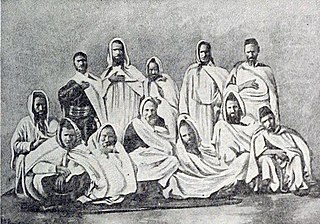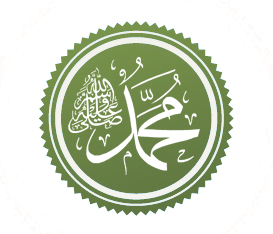Related Research Articles

North Africa is a region encompassing the northern portion of the African continent. There is no singularly accepted scope for the region, and it is sometimes defined as stretching from the Atlantic shores of Mauritania in the west, to Egypt's Suez Canal and the Red Sea in the east. Varying sources have limited it to the countries of Algeria, Libya, Morocco, and Tunisia, a region that was known by the French during colonial times as "Afrique du Nord" and is known by Arabs as the Maghreb. The most commonly accepted definition includes Morocco, Algeria, Tunisia, Libya, Egypt, and Sudan, the 6 countries that shape the top North of the African continent. Meanwhile, "North Africa", particularly when used in the term Middle East and North Africa (MENA), often refers only to the countries of the Maghreb.

Mohammad Al-Khamis Ben Youssef Ben Mohammed Al-Alaoui, known as Mohammed V, was Sultan of Morocco from 1927 to 1953; he was recognized as Sultan again upon his return from exile in 1955, and as King from 1957 to 1961. His full name was Sidi Mohammed ben Yusef, or Son of (Sultan) Yusef, upon whose death he succeeded to the throne. He was a member of the Alaouite dynasty.

Maghrebi Jews or North African Jews are native Jews who had traditionally lived in the Maghreb region of North Africa under Arab rule during the Middle Ages. Established Jewish communities had existed in North Africa long before the arrival of Sephardi Jews, expelled from Portugal and Spain. Due to proximity, the term 'Maghrebi Jews' often refers to Egyptian Jews as well. These Jews, those from North Africa, constitute the second largest Jewish diaspora group.
Mizrahi Jews or Mizrahim (מִזְרָחִים), also referred to as Mizrachi (מִזְרָחִי), Edot HaMizrach, or Oriental Jews, are the descendants of the local Jewish communities that had existed in the Middle East and North Africa from biblical times into the modern era.

Moroccan Jews constitute an ancient community. Before the founding of Israel in 1948, there were about 250,000 to 350,000 Jews in the country, which gave Morocco the largest Jewish community in the Muslim world, but by 2017 only 2,000 or so remain. Jews in Morocco, originally speakers of Berber languages, Judeo-Moroccan Arabic or Judaeo-Spanish, were the first in the country to adopt the French language, and unlike the general population French remains the main language of members of the Jewish community there.

Berber Jews are the Jewish communities of Maghreb which historically spoke Berber languages. Between 1950 and 1970 most emigrated to France, the United States, or Israel.
Stephen Alan Marglin is an American economist. He is the Walter S. Barker Professor of Economics at Harvard University, a fellow of the Econometric Society, and a founding member of the World Economics Association.
Jane S. Gerber is a professor of Jewish history and director of the Institute for Sephardic Studies at the City University of New York.

Ruth R. Wisse is the Martin Peretz Professor of Yiddish Literature and Professor of Comparative Literature at Harvard University emeritus. She is a noted scholar of Yiddish literature and of Jewish history and culture.

Very few texts in Judaism refer to or take note of the Islamic prophet, Muhammad. Those that do generally reject Muhammad's proclamation of receiving divine revelations from God and label him instead as a false prophet.
Moroccan Jews are Jews who live or have lived in Morocco. A significant Jewish population migrated from Spain and Portugal, after the Spanish Inquisition, to the area and settled among Arab-Berbers. They were later met by a second wave of migration from the Iberian peninsula in the period immediately preceding and following the 1492 Alhambra Decree, when Jews were expelled from Spain, and soon after, from Portugal. This second immigration wave changed Moroccan Jewry, who largely embraced the Andalusian Sephardic liturgy, to switch to a mostly Sephardic identity.
Otto Schnepp was an Austrian-American scientist.
North African Sephardim are a distinct sub-group of Sephardi Jews, who descend from exiled Iberian Jewish families of the late 15th century and North African Maghrebi Jewish communities.
During World War II, Morocco, which was then occupied by France, was controlled by Vichy France from 1940 to 1942 after the occupation of France by Nazi Germany. However, after the North African Campaign, Morocco was under Allied control and thus was active in Allied operations until the end of the war.
Hanna Reisler is an Israeli-American Professor of Chemistry at the University of Southern California. She is interested in the reaction dynamics of molecules and free radicals, as well as the photodissociation in the gas phase. Reisler established the University of Southern California Women In Science and Engineering (WISE) program.
Freedom of religion in Morocco refers to the extent to which people in Morocco are freely able to practice their religious beliefs, taking into account both government policies and societal attitudes toward religious groups. The state religion of Morocco is Islam. The government plays an active role in determining and policing religious practice for Muslims, and disrespecting Islam in public can carry punishments in the forms of fines and imprisonment.
Geoffrey Claussen is an American rabbi and scholar who serves as a professor of Religious Studies at Elon University. His scholarship focuses on Jewish ethics, theology, and the Musar movement.
The Thirty-Year Genocide: Turkey’s Destruction of Its Christian Minorities, 1894–1924 is a 2019 history book written by Benny Morris and Dror Ze'evi. They argue that the Armenian Genocide and other contemporaneous persecution of Christians in the Ottoman Empire constitute an extermination campaign, or genocide, carried out by the Ottoman Empire against its Christian subjects.
Wolf Gruner is a German academic who has been the Founding Director of the Center for Advanced Genocide Research at the University of Southern California Shoah Foundation since 2014. He currently holds the Shapell-Guerin Chair in Jewish Studies and is also Professor of History at USC. Since 2017, he is a member of the Academic Advisory Committee of the Center for Advanced Holocaust Studies at the United States Holocaust Memorial Museum.

The Holocaust in Bohemia and Moravia: Czech Initiatives, German Policies, Jewish Responses is a book by the German historian Wolf Gruner on the Holocaust in Bohemia and Moravia, the Czech-majority parts of Czechoslovakia partially annexed into Nazi Germany during the German occupation of Czechoslovakia. Beginning before the Munich Agreement, Gruner's book covers the various stages of persecution of Jews which led to their deportation and murder. He argues that the role of Czech collaboration and local initiatives was greater than has been conventionally assumed, and also that Jewish resistance to persecution was substantial. The book has received mixed reviews; some Czech historians have disagreed with Gruner's conclusions while other reviewers generally praised the book with some reservations. The book was published in German in 2016 and in English and Czech in 2019. It received the 2017 Sybil Halpern Milton Memorial Book Prize of the German Studies Association.
References
- 1 2 "Faculty Profile > Jessica Marglin". dornsife.usc.edu. USC Dana and David Dornsife College of Letters, Arts and Sciences. Retrieved 2019-05-30.
- ↑ "Jessica Marglin". usc.edu. Retrieved April 22, 2017.
- ↑ "Marglin, Jessica M." worldcat.org. Retrieved April 22, 2017.
- ↑ Bazzaz, Sahar (2018-10-01). "Jessica M. Marglin. Across Legal Lines: Jews and Muslims in Modern Morocco". The American Historical Review. 123 (4): 1433–1434. doi:10.1093/ahr/rhy174. ISSN 0002-8762.
- ↑ Ojeda-Mata, Maite (2018-09-02). "Across legal lines: Jews and Muslims in modern Morocco". Jewish Culture and History. 19 (3): 277–279. doi:10.1080/1462169X.2018.1516430. ISSN 1462-169X. S2CID 165949705.
- ↑ Gerber, Jane S. (2018). "Review". Bustan: The Middle East Book Review. 9 (1): 61–65. doi:10.5325/bustan.9.1.0061. JSTOR 10.5325/bustan.9.1.0061.
- ↑ "2016 Baron Book Prize Awarded: Jessica Marglin – AAJR". June 30, 2016. Retrieved 2019-05-30.
- 1 2 3 "Jessica Marglin, Nathan Perl-Rosenthal". The New York Times. 2008-06-22. ISSN 0362-4331 . Retrieved 2019-05-30.
- ↑ "Past Winners". Jewish Book Council. Retrieved 2020-01-25.